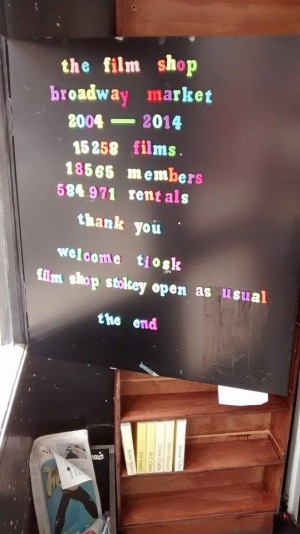You have no items in your cart. Want to get some nice things?
Go shopping(A.K.A. selling off the proverbial bunnies)

It’s hard to see the shelves with all of us in here drinking and reminiscing. But behind the bodies I can just make out the few remaining DVDs angling and slanting like teeth after the fist has been pulled out. The Film Shop on Broadway Market in East London has been punched in the face. It is dead. Those of us who worked here, along with a scattering of customers, are at the wake.
After a few drinks and a lot of encouragement, the Owner tells a story.
“You know that scene in Jean de Florette where Gerard Depardieu buys those bunnies in order to make his fortune?”
We nod. We know those bunnies.
“When I was setting up the shop and putting the DVDs on the shelves, I was thinking that they were my bunnies. I spent a year getting all these films together and I wanted them to go out into the world and multiply.” The Owner opens up his arms embracing the small shop floor.
“And now I am selling off my bunnies.”
We should have seen this coming. A DVD shop in 2014: It’s an oxymoron.
I am standing behind the counter where I have spent many hours of my life. Sarah approaches to tell me how the shop saved her life. When her partner (who I remember well) died, The Film Shop was the one place she could come to rent a few hours of respite. And now that it’s gone, she is mourning once again. I tell her about the young woman who was missing her hometown of Buenos Aires. I had given her Gilda to watch and from then on, whenever her family or friends from Argentina came to visit, she would bring them in to meet me saying that I had got her through a London winter. Although it wasn’t me at all, it was the incandescence of Rita Hayworth that got her through the darkness. Sarah and I agree there is such a thing as film therapy. And the battered leather log in the middle of the shop is as good as Freud’s couch.
The Film Shop was not a shop, but an archive: the culmination of 25 years of the Owner’s love of film, his obsessive need to collect and his profound knowledge of cinema. He had films that you could not find anywhere else. Antonioni’s Zabriskie Point for example was only legally available on DVD in the UK in 2009, but the Owner had a bootleg he would pass around. Same with Bertolucci’s The Conformist, and dozens of others. Some films took years to source. You just needed to mention an obscure film, and if he couldn’t find it, he would get the next best thing. For instance one customer was desperate to get Alain Tanner’s Messidor. The Owner searched high and low but it was not available anywhere. In its place he managed to get Jonah Who Will be 25 in the Year 2000. Requests would be answered with zero fanfare. Films would just magically appear.
When the shop first opened in 2004, my regular visits quickly morphed into getting a job. I was a film nerd, and here in the Shop, I could go public. I worked some of the day shifts, and the Owner and I did the Friday nights together. We would stick on Neil Young or Townes van Zandt or Bonnie ‘Prince’ Billy depending on our moods. Drunks came in to get warm, cinephiles came in with requests like, “have you got any films with people falling off bridges?” (We gave them Vertigo.) Couples wanted ‘date films’ – the women making a beeline for the new Sandra Bullock or Jennifer Aniston releases while their boyfriends swallowed hard and said, “Um, yeah, I’m good with Armed and Fabulous”.
Most nights I would be asked, “What have you got that’s funny?” To which I would reply, “What was the last thing you watched that made you laugh?” I could usually work from there. Humour is not universal. People who were freshly dumped would go for the Judd Apatows and Vince Vaughn vehicles. I would steer them towards Hawks or Wilder or The Sweet Smell of Success or Double Indemnity. Something so completely brilliant that it would suck them in, releasing them temporarily from the pain in their heart. A bad film that tries to be funny cannot cheer anyone up. But a brilliant, sad film can.
Kids would sometimes run off with DVD cases not knowing they were empty. I remember one kid asking for anything violent. The Owner handed him a subtitled Japanese film. The boy didn’t like reading so why would he watch a film he needed to read, he challenged. The Owner sent him off with a subtitled Manga film and made a deal: if the kid liked it, he could pay for it. If he didn’t, he could bring it back free of charge. The kid came back, and paid. The Film Shop attracted people who lived on the periphery of society. People who were making films, composing music, writing novels, working on installations or simply drifting. You could rent three films for less than the price of a sandwich down the road.

The attraction that the Film Shop held for people who had nowhere else to go was part of its fabric and its atmosphere. When acquaintances found out I worked there, I would often be told how they were too embarrassed to go in and hire the new Jane Austen adaptation for fear of not having high enough standards. One Friday night a couple came in wanting Brokeback Mountain for a relaxing night in. The Owner was reluctant to rent it to them because, in his view, it was too long, badly edited and relied too much on digital manipulation. It was not a film he approved of even though the completist in him had it on the shelves. He eventually capitulated. One woman I met in a park told me she felt intimidated because all the directors were alphabetical. That was somehow a step too far for her. Not to mention the ear-splitting electronica that would get cranked up to 11 when certain staff members didn’t like the look of a customer. Stepping into the Film Shop was a mix of spiky edginess and a warm embrace.
Despite the richness of the Film Shop as an experience, it ended up being collateral damage in the march of technology towards DVD obsolescence. The Owner held out against Netflix and the endless stream of content for ten years. But when you hear that on New Year’s Day 2004 the shop rented out close to 400 films, but on New Year’s Day 2014 rented out just over 40, you get a picture of what he was up against.
At the farewell party, there is a feeling of sadness and despair. The back catalogue has been sold off, given away, or kept by the Owner. The one positive note in this whole sorry tale is that the Film Shop in Stoke Newington took some of the stock and is still standing. When that goes, we’re truly stuffed. The loss of the Film Shop on Broadway Market however, feels symptomatic of something much greater: the neighbourhood is losing one of the last places holding out against the forces of luxury flats, estate agents and Bugaboos. No longer will anyone within walking distance be able to head out just before ten p.m. to pick up that obscure object of desire. And don’t tell me it’s all fine because you can find Jean Eustache’s The Mother and the Whore online, because you can’t.
The fact that the owner created a physical hub of intense dialogue around cinema meant that human interaction triumphed over a lazy acceptance of the corporate funnelling of content into our lives. This human element is being lost in favour of a private and individual consumption of material. Content has triumphed over context – the context here being one of brushing up against fellow human beings. Using the Film Shop didn’t involve a faceless algorithm: ‘if you liked that, then you might also like this.’ Knowledge, passion and humanity informed one’s choices.
The medium has absolutely become the message, and the message is that we all need our own personal cinema on our phones (because we’re all so busy and on the move, aren’t we). Why would we want to share our experience collectively anyway? Why go out and hire a film you’ve never heard of because the cute guy in the queue is talking about it, when you can download the latest HBO series without leaving your flat? Why experience the outside world and the mess, the challenge, the pleasure that comes with it when you can stream content chosen not by you or the cute guy in the queue, but by the marketing people at iTunes. Who needs to ever leave their house again? We have all become isolated islands consuming content for our individual pleasure. Great, isn’t it.
For anyone who hasn’t seen Jean de Florette: a drought kills off the bunnies and Jean, hit by a falling rock, dies.

About Joanna Pocock
Joanna Pocock graduated with distinction from the Creative Writing MA at Bath Spa University. She is a contributing travel writer for The LA Times, and has had work published in The Nation, Orion, JSTOR Daily, Distinctly Montana, the London Sunday Independent, 3:AM, Mslexia, the Dark Mountain blog and Good Housekeeping, among other publications. In 2017 she was shortlisted for the Barry Lopez Creative Non-fiction Prize and in 2018 she won the Fitzcarraldo Editions Essay Prize. 'Surrender', her book about rewilders, nomads and ecosexuals in the American West, will be published by Fitzcarraldo in 2019. She teaches Creative Writing, both fiction and non-fiction, at Central St Martins in London. Some of her writing can be found at: www.joannapocock.blogspot.co.uk and www.missoulabound.worpress.com





Is this ‘owner’ the same wicked individual – Sebastian Fieril – who went to court to defend the notorious thug Russell Levy?!
Broadway Market is a much safer place now that evil shop is gone.
https://www.standard.co.uk/news/bourne-actor-faces-jail-again-6753323.html
Bourne actor faces jail again
A film villain who was released from jail three weeks ago after breaking
a friend’s ankle is facing prison again today after a café brawl.
Russell Levy – who played CIA assassin Manheim in The Bourne Identity – denied racially abusing Constantino Ruggiu, 46.
But the East End actor, 47, who has appeared in ITV SAS drama
Ultimate Force, admitted a public order offence at Snaresbrook crown
court yesterday. The actor was involved in a “drunken fracas” at a café
in Spitalfields on 15February last year.
In April, Levy was jailed for 18 months for shattering a friend’s
ankle in August last year. But the actor was freed three weeks ago
having served most of his jail term on remand.
Levy was due to stand trial for attacking Mr Ruggiu but prosecutors
accepted his plea to the lesser charge. Levy, of Hackney, was bailed
until sentencing on 26 August when he was told he may face a jail term.
Bourne actor jailed over assaulting witness
00:00, 9 April 2009
By Dailyrecord.co.uk
A THUG who played a villain in a hit Hollywood movie was
yesterday jailed for inflicting “grave” injuries on a man who dared
testify against him.”
LEVY: MATT DAMON FILM VILLAIN BEHIND BARS FOR CAFE ATTACK SPITALFIELDS,
HACKNEY, E LONDON;
A film villain was back behind bars today (tues) for carrying out
another violent attack – just hours after he was released from prison.
Russell Levy, 47 – who played CIA assassin Manheim opposite Matt Damon
in spy thriller The Bourne Identity – hurled furniture and tipped beer
over cafe manager Constantino Ruggiu, 46. – See more at: https://www.courtnewsuk.co.uk/online_archive/?courts=30&page=200#sthash.FFl1Bk3u.dpufw
Russell
Levy, 47, who played CIA assassin Manheim in hit 2002 spy thriller ‘The
Bourne Identity’ was jailed for 18 months for punching Mark Rushbury,
49, and shattering his ankle. – See more at:
https://www.courtnewsuk.co.uk/online_archive/?name=russell+levy&place=hackney&courts=30#sthash.FFl1Bk3u.dpufw